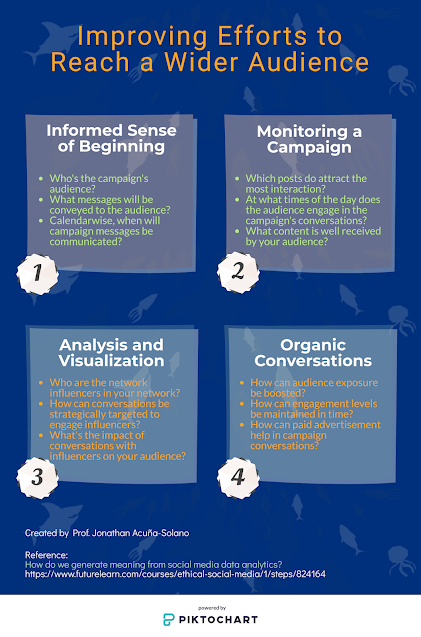Improving Efforts
to Reach a Wider Audience
Suggestions
and Questions
All types of cultural institutions do
look for ways to improve their efforts to rich a wider audience with their
brands or campaigns. Many just send out messages expecting that someone out
there will react to them. What company directors sometime forget is what it is
that they plan to forfeit to gain meaningful presence in social media. Prof.
Jonathon Hutchinson
The following infographic identifies
the four different areas pointed out by Prof. Hutchinson
Right here what is presented is not a
pesky questionnaire for community managers but a sample contextualization of
these generic questions on a cultural institution’s new brand product to
promote English language learning beyond the classroom and through social
media. However, none of the questions have been answered and are just a nice
collection of ideas to explore to guarantee success in institutional efforts to
reach a wider audience of learners. Not paying attention to these areas
specified by Prof. Hutchinson will make organizations stay stuck in their
comfort cocoon and their improvement efforts will fade away in the directors’
eyes in sore dismay.
Informed Sense of
Beginning
|
[A] |
Who
is the institution’s audience among its different cohorts of students? · New
learners? · All
learners? · Specific
age groups? |
|
[B] |
What
messages will the institution convey to its learners? · Learning
tips? · Calls
for study groups? · Brain
teasers to study? |
|
[C] |
Calendarwise,
when will the institution communicate its messages? · Any
weekday? · Just
on the weekends? · Specific
moments during the month? |
Monitoring a
Campaign
|
[A] |
Which
institutional posts attract the most student interaction? · Learning
tips? · Study
tips? · How
to consolidate their learning? |
|
[B] |
At
what times of the day do students engage in institutional conversations? · Early
morning? · During
the afternoon? · In
the evenings? |
|
[C] |
What
content is well received by the institution’s learners? · Academic? · Commercial? · Study-related
tips? |
Analysis and
Visualization
|
[A] |
Who
are the network influencers in the institution’s social networks? · Institutional
students? · Outsiders? · Educators? |
|
[B] |
How
can institutional conversations be strategically targeted to engage
influencers? · Through
a community manager? · By
hiring the influencer(s)? · Through
an uncovered (institutional) participant? |
|
[C] |
What
is the impact of conversations with influencers on the institution’s
audience? · Does
the audience profit from it? · Does
the audience not engage? · Does
the audience desert the conversation? |
Organic Conversations
|
[A] |
How
can student exposure be boosted? · Partnerships
with influencers? · Contests? · Invitations
to talks to experts? |
|
[B] |
How
can engagement levels be maintained in time? · With
similar content? · With
content co-produced by learners and the institution? · With
content prodused exclusively by learners? |
|
[C] |
How
can paid advertisement help the health of institutional conversations? · To
direct traffic toward institutional media channels? · To
co-create content for brand campaigns? · To
survey the audience about content/campaign they want to see? |
Organizations should not cease plying their social media channels. Companies have to hover around these four areas of media analytics to create healthier and truthful conversations with learners. Neither the institution’s directors nor their marketing staff have a belt of prowess to identify the success of a brand campaign; all efforts for improvement can be swept down by the lack of student interest. To dispel the darkness around brand failures is not linked to be insusceptible to criticism; it is connected to identify the “quernstone” that can help the organization grind the different individual who are part of its audience comprehend these people to take them into its conversations.
References
The University of Sydney. (2020). How do we generate meaning from
social media data analystics? Retrieved Octubre 14, 2020, from
FutureLearn.Com:
https://www.futurelearn.com/courses/ethical-social-media/1/steps/824164
Improving Efforts to Reach a Wider Audience by Jonathan Acuña on Scribd











Post a Comment